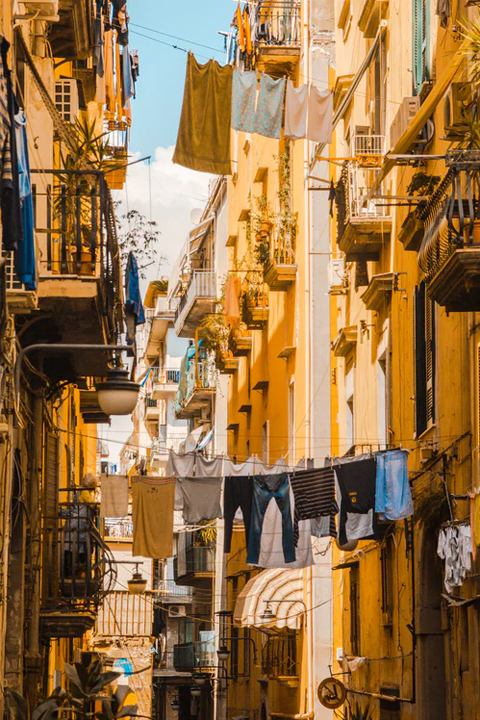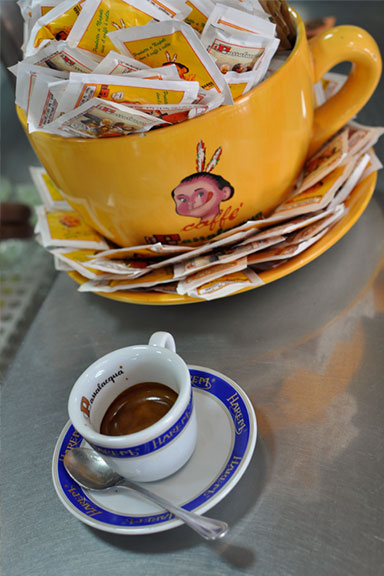Naples, the capital of espresso!

A historic Italian city with a special color, rich gastronomic tradition and excellent coffee: meet Naples!
The Italians may not have discovered the coffee, but they are largely responsible for its current form, its worldwide spread, and of course one of the most popular extractions, espresso. Espresso is the predominantly "Italian" coffee as it was invented & developed in Italy.
Along with espresso machines and extraction techniques, the "coffee culture" has evolved, of course: a set of behaviors related to both the extraction and taste of coffee and its social dimension: the form of coffee espresso bars, how people tend to enjoy their coffee, coffee's place in human daily life are just a few aspects of what we call "coffee culture".
The culture of coffee in Italy, of course, while having some basic principles, varies from region to region depending on social and economic conditions. Sure, there are basic principles that apply to espresso in every Italian city, but each region has developed its own espresso-specific culture that gives coffee unique characteristics.
A city with a vibrant folk culture and heavy gastronomic tradition, like Naples, could not have its own, personal way of enjoying its espresso.
 Naples, the "Capital" of Italy
Naples, the "Capital" of Italy
Naples, founded in the 6th century BC as Neapolis, is the capital of the province of Campania and one of Italy's major ports, but also the third largest Italian city. It adjoins areas of significant natural beauty and archaeological significance, such as Mount Vesuvius and the ancient city of Pompeii, while its historic center is Europe's largest, covering an area of 17 square kilometers.
Naples is renowned for its gastronomy, based on local products and materials such as mozzarella and anhydrous volcanic tomatoes from San Marzano, as well as seafood. Undoubtedly, Naples' greatest offering in the world is none other than pizza: the popular dish was born and developed in Naples, and "migrated" to America by Neapolitan immigrants. In Naples one can still find the authentic form of pizza today, which is even protected by law. However, locals are not only proud of their pizza, but also of their espresso!
How do the Neapolitans drink their coffee?
Napoleans are used to boasting that Naples is the "home" of espresso, at least its "capital", but both are Neapolitan exaggerations. On the one hand, espresso was developed simultaneously throughout Italy, and on the other there are other Italian cities famous for their espresso. But this probably shows the position of coffee in the heart of the locals.
Naples coffee seems to have stuck to an older era. Modern cafeteria chains are scarce, while shops with sophisticated extracts and beverages do not exist. Espresso bars are traditional and, for the rest of Europeans, have a retro air, and even the machines used are old, often with huge levers, and the staff, baristi, sometimes look like Italian neo-realism film heroes. In Naples, or at least in her kitchen and her café, everything has to do with authenticity, simplicity and quality.
Naples coffee is espresso, in what is simply called "caffe". Locals tend to drink 4 or 5 espressos a day, around the clock, usually standing in the bar. In the morning, coffee is accompanied by a snack, such as the local sfogliatelle, but the coffee-maker has no working hours and extends throughout the day. Drinks such as cappuccino and / or Shakerato are not unknown to the Neapolitan, but the main protagonist is espresso - which is particularly cheap, as long as one stands up on the counter rather than the tables, which are almost exclusively for tourists.
 How does Neapolitan espresso taste?
How does Neapolitan espresso taste?
It would be an exaggeration to try to define the taste of Neapolitan coffee, but it is worth noting that the Neapolitan preferred their coffee strong and intense, and almost always with the addition of sugar. Particularly in the past decades, Neapolitan espresso was famous for its strong and relatively bitter taste, while locals used generous amounts of sugar, which sweetened its taste and helped create more compact cream. It is also worth noting that the darker degree of roasting coffee was formerly known as "Neapolitan Roast", that is, "Neapolitan roasting", which explains the particular espresso of the Neapolitan espresso and the love of the loco.
How can we bring Naples in our cup?
Naples is a city that is identified, among other things, with good coffee. The Neapolitan coffee, despite its reputation, is no longer as strong and intense as it used to be, but it hides in it the passion, passion and love that the Napoleonic people have for espresso. Naples operates some of the most famous espresso companies, which with their excellent blends can bring the Neapolitan breeze to our cup.
Passalacqua started as a family business in post-war Naples and today is one of the most popular Neapolitan coffee brands available. The company's expert blenders make fine blends from around the world, while roasting blends bring out the aromas of coffee. It is perhaps the most beloved brand for locals, as it supplies most espresso bars with coffee. Each blend hides Naples's passion for coffee and the range of flavors will suit every taste.
But the family business is also Kimbo, started by the love of three brothers sixty years ago, when they started roasting coffee in their father's bakery in Naples. The three brothers perfected the technique of roasting and blending, ending up with Kimbo, a Neapolitan espresso ambassador company who holds a significant share of both the Italian and European markets. Kimbo's blends are full of flavor and special aroma, due to the company's high know-how and excellent raw material - that is, good coffee.
Naples breadmakers are accustomed to saying that their city has three beautiful things: the sea, Mount Vesuvius, and sfogliatelle- and espresso, we would complement! Βòna Jurnàta, Napule!










